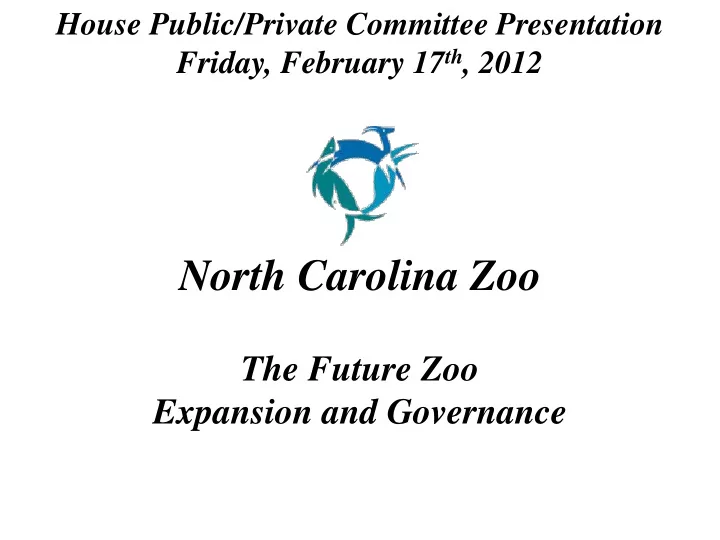

House Public/Private Committee Presentation Friday, February 17 th , 2012 North Carolina Zoo The Future Zoo Expansion and Governance
North Carolina Zoo Expansion Plans
Asia Asia would occupy undeveloped space between the two existing parking lots Primary focus will be on China and India with some exhibits devoted to Southeast Asia This area will have the potential for exhibiting Tiger, Orangutan, Indian Rhinoceros, Snow Leopard, Camel, Colorful Pheasant and possibly Panda
Asia Estimated cost for development is approximately $110 Million This addition would add approximately 300,000 visitors each year Additional visitation would increase Zoo total income from $7 Million dollars each year to $13 Million The $6 Million difference would be sufficient to offset the costs
North Carolina Zoo Annual Attendance by Fiscal Year
North Carolina Population 25 Mile Radius .27 Million 50 Mile Radius 1.8 Million 100 Mile Radius (2011 Population Estimate) 7.5 Million 100 Mile Radius (2014 Population Estimate) 8.2 Million
Peripheral Land Zoo must create its own “Critical Mass” Heavy regional competition for Water Parks and Family Entertainment Centers Most of competing facilities are located in Urban Areas
Peripheral Land Enhanced Option 250-300 Rooms. 4-Star Standard 50 upscale cabins with 4-8 beds each Expanded restaurant and retail facilities Significant family oriented recreation facilities- water, adventure play, biking and horses Would support $105 Million dollar investment Operating net income $11 Million dollars (24%)
Annual Economic Impact Existing Zoo Facilities Expenditures: $146 Million Employment: 1,655 Jobs Tax Impact: $2.9m Randolph County $5.3m State of North Carolina
Annual Economic Impact Peripheral Land Enhanced Peripheral land plus existing Zoo Expenditures: $264 Million Employment: 2,630 Jobs Tax Impact: $5.3m Randolph County $9.7m State of North Carolina
North Carolina Zoo Governance Study Update
Why Zoos Consider a Shift in Governance 75% of AZA accredited zoos under private management – most with public partners – true PPP…(public/private partnership) Creates an entrepreneurial business approach Provides flexibility in response to staffing & visitors Allows for cost efficiencies by eliminating the duplication of efforts and in purchasing services
Why Zoos Consider a Shift in Governance Creates market-based pricing strategies Offers a re-investment strategy as “what is earned at the Zoo is invested in the Zoo” Strengthen private financial support for the Zoo Investment in new facilities, exhibits and attractions Provides new opportunities to engage the regional & State-wide communities Solidify the Zoo’s annual funding structure
Why Zoos Consider a Shift in Governance Develop strategic partnerships to increase income and investment Speed up decision making process Encourage a management culture best suited to the Zoo’s Needs Enables long-term planning and resultant timely actions
Potential Organizational Structure under PPP Structure Owns Land/Assets State of NC Annual Appropriation Major Donor Deferred Maintenance Management Agreement Governance Board of Directors Society Manages & Operations Committees Funding/Fund-raising Private Funding Support CEO Zoo Staff/Operating Departments
Strategic Funding Model Operations State Appropriation Sustainable & Viable Model Visitor/Earned $$$ Contributions Transition Funds Private $$$ Society State Deferred Maintenance State Capital Projects IT Private Contributions Branding Individuals Signage Foundations Logo Corporations Guest Amenities Major Donors Leveraging State $$$
Deferred Maintenance Building Repairs 19.0 m Exhibits/Fencing/Glass 4.0 m Parking/Roads/Paths 2.5 m Heavy Vehicles 2.0 m Water/Sewer/Irrigation 1.5 m Electrical/Energy 1.0 m 30.0 Million
Transition Needs Technology-phones/computers/servers/software Signage-Banners/Branding/On-site Signs Equipment-Vehicle Replacements/Maintenance Training-Employees and Volunteers Master Planning-Must be updated
Appropriations FY Actual Attendance Actual State Appropriation 2001-02 671,619 $7,363,259 2001-03 576,093 $8,253,189 2003-04 676,956 $8,075,991 2004-05 709,030 $8,688,470 2005-06 682,977 $9,437,318 2006-07 746,650 $10,957,664 2007-08 729,500 $11,472,868 2008-09 729,615 $11,483,834 2009-10 749,627 $11,131,782 2010-11 741,119 $11,451,024
Key Points $10 Million in appropriations $5 Million a year for 6 years to catch up on backlog maintenance (Total $30 Million) $3 Million transition
Key Points Maintenance of High Quality, World Class Facility Flexible, Entrepreneurial, Time Sensitive Business Approach Increased Private Support Creation of Income Generating Partnerships
Recommend
More recommend